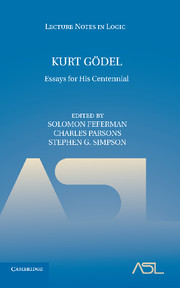Book contents
- Frontmatter
- Contents
- Introduction
- GENERAL
- PROOF THEORY
- SET THEORY
- PHILOSOPHY OF MATHEMATICS
- What did Gödel believe and when did he believe it?
- On Gödel's way in: The influence of Rudolf Carnap
- Gödel and Carnap
- On the philosophical development of Kurt Gödel
- Platonism and mathematical intuition in Kurt Gödel's thought
Gödel's conceptual realism
Published online by Cambridge University Press: 04 August 2010
- Frontmatter
- Contents
- Introduction
- GENERAL
- PROOF THEORY
- SET THEORY
- PHILOSOPHY OF MATHEMATICS
- What did Gödel believe and when did he believe it?
- On Gödel's way in: The influence of Rudolf Carnap
- Gödel and Carnap
- On the philosophical development of Kurt Gödel
- Platonism and mathematical intuition in Kurt Gödel's thought
Summary
Kurt Gödel is almost as famous—one might say “notorious”—for his extreme platonist views as he is famous for his mathematical theorems. Moreover his platonism is not a myth; it is well-documented in his writings. Here are two platonist declarations about set theory, the first from his paper about Bertrand Russell and the second from the revised version of his paper on the Continuum Hypotheses.
Classes and concepts may, however, also be conceived as real objects, namely classes as “pluralities of things” or as structures consisting of a plurality of things and concepts as the properties and relations of things existing independently of our definitions and constructions.
It seems to me that the assumption of such objects is quite as legitimate as the assumption of physical bodies and there is quite as much reason to believe in their existence.
But, despite their remoteness from sense experience, we do have something like a perception also of the objects of set theory, as is seen from the fact that the axioms force themselves upon us as being true. I don't see any reason why we should have less confidence in this kind of perception, i.e., in mathematical intuition, than in sense perception.
The first statement is a platonist declaration of a fairly standard sort concerning set theory. What is unusual in it is the inclusion of concepts among the objects of mathematics.
- Type
- Chapter
- Information
- Kurt GödelEssays for his Centennial, pp. 356 - 373Publisher: Cambridge University PressPrint publication year: 2010



